Below is a list of workshop titles, descriptions, and instructor bios. Aside from a couple evening and early morning workshops, the rest will either happen during our 9-11am or 1-3:30pm time blocks on Saturday June 4. We will have a posted schedule of all the workshops at the event.
JOYFUL INTERPENETRATION: A Writing Workshop for All - Led by: Sarah Rabkin
We humans are born of and sustained by the larger-than-human world; when we attend to goings-on among creatures, plants, air, water, and soil, we tap into wisdom we didn’t know we had. Writing can facilitate such communion—what poet-philosopher Gary Snyder called “joyful interpenetration for all.” In this outdoor workshop, open to writers and naturalists at all levels of experience, we’ll cultivate language as a conduit to understanding. Bring a notebook, something to write with, a watch or other timekeeping device, and perhaps a small foam pad or other lightweight portable aid for sitting comfortably on the ground.
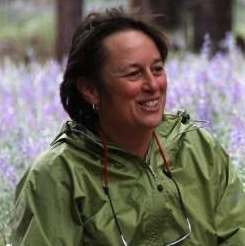
About Sarah: Workshop instructor Sarah Rabkin is the author and illustrator of What I Learned at Bug Camp: Essays on Finding a Home in the World. She taught writing, journalism, and environmental studies at UCSC for more than 30 years. A leader of outdoor writing workshops and retreats around the American West, she holds degrees in biology and science communication. Sarah is currently seeking a publisher for her new book, The Quiet Activist: How Artists, Dreamers, and Healers Help Heal the World. She lives in Soquel with her husband, poet Charles Atkinson.
Traditional Knowledge and Science Led by: Frank and Hinano Murphy
--workshop description forthcoming--
About Frank and Hinano:
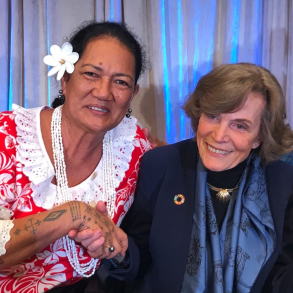
About: Hinano Murphy is a widely recognized expert in Tahitian cultural history. She grew up on Moorea and Tahiti learning oral traditions from her elders. She worked in education as a school teacher and later in her career she served as a technical advisor to the government, developing Tahitian language/culture programs for the schools. She then became the associate Director of the UC Berkeley Gump Research Station and the President of the cultural organization Te Pu Atitia, where she founded the Atitia Cultural Center on Moorea. Most recently she is serving as the Cultural Director for Tetiaroa Society and the head of the Cultural Committee that advises on all cultural matters in Tetiaroa.
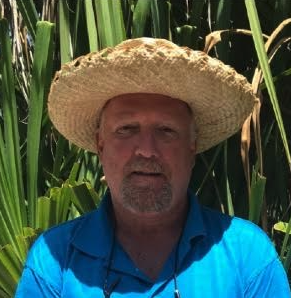
About: Frank Murphy grew up in Southern California but has lived and worked in French Polynesia since 1992. He completed BAs in Biology and Environmental Studies at UC Santa Cruz, and an MA in Geography from UC Berkeley working on Holocene sea level indicators in French Polynesia. He has been Manager and Associate Director of the UC Berkeley Gump Research Station, and owner of an adventure travel company, Tahiti Expeditions. He is now the Executive Director of the Tetiaroa Society, which facilitates scientific research, and carries out conservation programs, natural and cultural history tours, and educational programs on the private island of Tetiaroa.
Mindfulness Practice for Presence: at home and in the wild Led by: Tim Burnett
Mindfulness is meeting our moments with more clarity, awareness, presence, and acceptance. Mindfulness training acknowledges that being in the middle of a busy mind is a challenging and wonderful place to be - and it's where we all are. The workshop will offer simple tools and practices for meeting our minds with clarity and kindness and returning to present moment experience. The benefits of this are many for all walks of life.
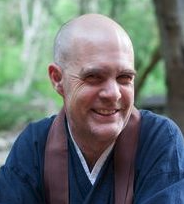
About Tim: After a brief career in botanical field work, Tim Burnett (NHFQ 1987, UCSC 1989 Biology & Environmental Studies) became a teacher of mindfulness and Soto Zen Buddhism. He is Executive Director and lead teacher of Mindfulness Northwest, founded in 2011, which offers mindfulness classes, trainings and professional development, and Guiding Teacher of Red Cedar Zen Community, a Soto Zen practice community in Bellingham, Washington, that he co-founded in 1991. Tim believes passionately in the healing power of just being present for our lives and hopes that through our practice we will help to heal the world together. For more about Tim see www.MindfulnessNorthwest.com and www.RedCedarZen.org
Hatha Yoga Led by: Shawna Harvey
About: Shawna Harvey: Shawna has a B.A. in Enviornmental Science/Marine Biology, A Certificate in Science Communication and Illustration, A Masters in Museum Studies, Anthropology and Forestry Recreational Resources. As a Yogi she has a 500 Level YTT Yoga Teacher Certificate. Shawna teaches a variety of yoga classes including: Hatha, Ahstanga, Iyangar, Compassion, Special Needs and Yoga for First Responders. She has 35 years of Contemplative Studies in metaphysics and meditation.She lives and teaches in Corvallis, OR.
Data Is Not the Destination – The Future of Community Science Led by: Christian Schwarz
What are the roles of aesthetics, spirituality, and community in the process of science? How can we incorporate more abstract experiences and motivations into a paradigm of sustained, iterative knowledge-making? Where might our practices lead us beyond the bounds of mere data?
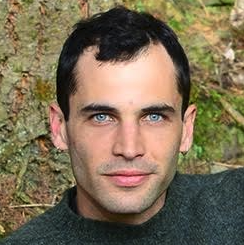
About Christian: Christian Schwarz is a mushroom enthusiast and taxonomist and citizen science advocate from Santa Cruz, California. He spends most of his time researching, teaching about, photographing, and making collections of macrofungi. He’s travelled in search of fungi throughout the United States, as well as Mexico, central America, New Zealand, Indonesia, and Europe. He's also an excitable birder, fisherman, and tidepool-investigator.
Biomimicry: The Practice of Learning from Nature to Create a Life-Friendly Future Led by: Lily Urmann
Biomimicry is an emerging field that looks to nature’s forms, processes, and systems to inspire life-friendly design. This impactful practice has the potential to shift our trajectory and embeds in us a sense of appreciation and deep connection to Nature. In this hands-on workshop, you can begin your biomimicry journey! Lily will introduce the topic of biomimicry and participants will take a deep dive into understanding “how nature works”, translate these learnings into a design principle based on strategies identified, and brainstorm ways in which this design principle can be applied in our built environment.
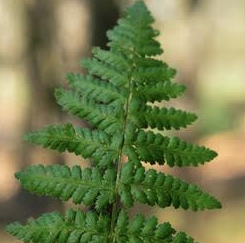
About Lily: Lily received her MS in Biomimicry at ASU (2020) and BA in Environmental Studies at UCSC (2016). Lily attended NHFQ 2016, where she strengthened her nature connection and became passionate about biomimicry. Lily was the Program Coordinator at the ASU Biomimicry Center, where she launched one of the first undergraduate certificates in biomimicry. She has spoken and led workshops at ASU, the Natural History Institute, Desert Botanical Garden, and Highland Center for Natural History. She is now teaching a class she created at Pratt Institute called “Biology for Biomimicry” and works with Biomimicry Frontiers to strengthen educational offerings for professionals.
Transforming Information into Image: Story as an Interpretive Tool for Cultural and Natural History Programs Led by: Bethany Kilzer
This workshop is meant to inspire you to use story in your interpretive programs, to understand the value of story, and to encourage you in your ability to tell stories. You will learn techniques and tips for crafting and finessing an oral story. Also, we will discuss how to present the story, where to use story in your programs, types of stories, locating stories, and (if we have time) story activities for children’s groups. You will hear story examples, from folktale to anecdote, and you will leave with a working story from one of your own natural history moments.
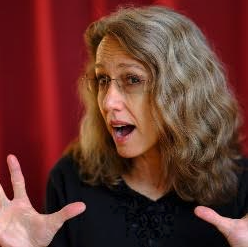
About Bethany: Bethany (NHFQ ‘86, BA Environmental Studies ‘87) discovered the power of story in 1987 when she heard stories of the Plant People. That began a journey of story study and incorporation of storytelling in her interpretive programs at the various State Parks where she worked. By 1989, she was freelancing storytelling, and created and performed story programs for State and County Park events, schools, libraries, private events and more. Additionally, she developed and presented workshops on storytelling techniques for multiple groups including Park docents, rangers, interpretive staff, and museum docents, and taught a 3-hour workshop for 15 years at West Valley College.
Nature Macro Photography. Getting great shots of little bits of life. Led by: Paul Kilzer
Intended for beginner to intermediate photographers, this workshop’s goal is to help participants either get started in macro photography or take their work to the next level. Bringing a macro capable photo rig is strongly encouraged. This workshop will start with a lecture and group discussion about the fundamentals of good macro photography and how to progress as a photographer, liberally illustrated with example photos from the leader’s two decades of practice. The workshop will move outside for a practical session where technique will be demonstrated and participants encouraged to use their cameras, then conclude inside with a photo review.
Note: Participants who want to do the hands-on portion of the workshop should bring a macro capable camera setup, and possibly a small inanimate object to practice shooting.
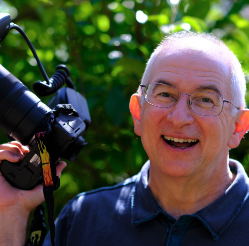
About Paul: Paul’s Father began taking him backpacking at the age of five. Out in the wilderness, Paul was taught to appreciate and respect the wonders of nature. A UCSC Computer and Information Science major, Paul chose to affiliate with Porter, the Arts college, hoping to get a well-rounded education by osmosis. Following years of taking horrid photos, Paul first held a digital camera in the summer of 2000. Seeing the near instant feedback of digital, he realized he could finally learn to take a decent picture. After decades of practice, people no longer complain about the quality of his photos.
Cultural Relevancy in Outdoor Education and Recreation Led by: Kevin Condon and Jessica Correa
Cultural relevancy has gained much attention in outreach and education programs over the last few years, but it has long been an important concept as we strive toward inclusion of a diverse group of people in any community. Justice Outside defines cultural relevancy as, “effectively reaching and engaging communities and their youth in a manner that is consistent with the cultural context and values of that community; while effectively addressing the disparities of diversity and inclusion within an organization’s entire structure.” Join our space for a conversation and generate an understanding of cultural relevancy and the role that it plays in natural history, outdoor education, and recreation.
About Kevin and Jess:
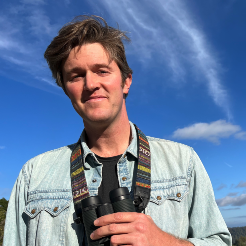
Kevin: Kevin Condon is director and co-founder of The Bird School Project, an outdoor education program based in the Monterey Bay region. Kevin is a UC Santa Cruz Environmental Studies graduate and was a student and teaching assistant on Natural History Field Quarter 2011, 2014, & 2015. Kevin began his journey in outdoor education as a student leader for UCSC’s Adventure Recreation program in 2009. Since then, he has directed UCSC’s Wilderness Orientation program and become a river instructor for the National Outdoor Leadership School (NOLS). Kevin leads with a learner’s mindset, leaning into challenges, pursuing shared interests, creating, and having fun.
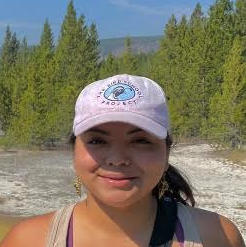
Jess: Jessica Correa is a naturalist and educator, she is the Student and Community Programs Manager for the Bird School Project. Jess studied Sociology and Environmental Studies at UC Santa Cruz which informs the work she does today. She is currently part of a cohort for the Rising Leaders Fellowship at Justice Outside. Through this fellowship, she will continue to grow her knowledge of justice, diversity, equity, and inclusion and incorporate it into her work with The Bird School Project and beyond.
Getting (Re)acquainted with Plants: Recognizing California's Common Families Led by Eric Engles
We'll look closely at representatives of common plant families and determine together what floral and vegetative characters best indicate membership in the plant's taxonomic family. After becoming familiar in this way with about 10 families, we will collectively key at least one plant in the Jepson manual. To wrap up, we will talk about how you can further practice and apply your identification and observation skills in various settings, from camping trips to choosing native landscaping plants at your local nursery. This workshop is suitable for botanical beginners—though we will assume you know the difference between a stamen and a pistil.
About Eric: An amateur botanist for 40 years, Eric leads botany workshops for the California Naturalist program and frequently works as a volunteer instructor for Natural History Field Quarter. He was a Field Quarter student in 1981, TA in the 1990s, and instructor in 2009 and 2014.
Nature Games Led by: Sarah Wheatley and Darrow Feldstein
We will use all our senses to have fun in nature! Adults and children welcome; small children should be accompanied by an adult.
About: Sarah and Darrow: Both were TA's together for NHFQ 2012 and still enjoy playing, naturalizing and making music together whenever possible.
Early Morning Birding with Sophie Noda (Saturday) and Ivan Samuels (Sunday)
Our group will be meandering through the redwoods and meadows of Jones Gulch camp in the early morning with an eye and an ear out for our winged, avian friends. Our goals will be to share our appreciation for birds, to learn from each other, to build community with other birders, and of course to see some birds! A casual birding walk with special effort to identify bird species by voice. Bring your own binoculars if you have them. We will have some to lend out too.
About Sophie: My name is Sophie Noda and I am a field quarter alumni (Class of 2016), natural history enthusiast, and ecologist. I am currently based in Sonoma County where I work for Point Blue Conservation Science, a conservation non-profit based in Petaluma, CA. My work lies in measuring the ecological function of rangelands using the metrics of soil health, vegetation cover and diversity, and bird abundance and diversity. I love spending time on working landscapes and learning about the ways that management like grazing effects the ecology of oak savannas and grasslands. Birds were my first love in natural history, but I am growing more and more fond of botany, insects, soil, and trying to understand the ways it's all connected.
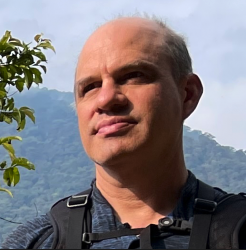
About Ivan: Ivan Samuels (class of 1998) has been birding for 36 years. A CA native, Ivan completed a double major in Biology and Environmental Studies at UCSC, followed by a master's degree in Zoology from the University of Florida. He is actively involved in environmental philanthropy and ecological forest management, and has been a supporter of the Norris Center since its inception in 2014.
Reptiles and Amphibians of California, led by Max Taus
--workshop description and instructor bio forthcoming--
Stargazing, led by "Cosmic" Joe Jordan
--workshop description and instructor bio forthcoming--

